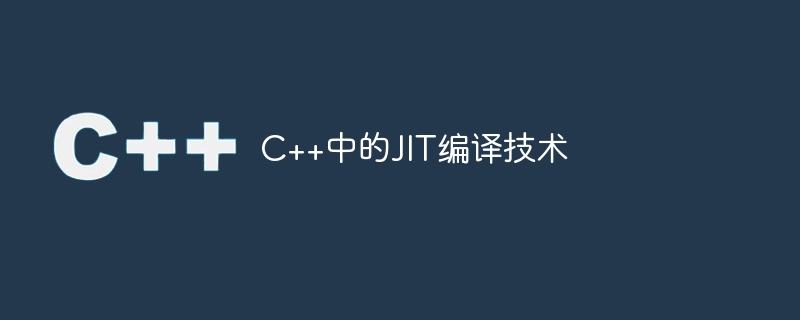Home >Backend Development >C++ >JIT compilation technology in C++
JIT compilation technology in C++
- WBOYWBOYWBOYWBOYWBOYWBOYWBOYWBOYWBOYWBOYWBOYWBOYWBOriginal
- 2023-08-22 15:01:541506browse

JIT compilation technology in C
With the development of software technology, compiling and interpreting two methods of running programs have become common program execution methods. C, as a compiled language, is designed to execute efficient programs quickly. However, C can also use JIT (just-in-time compilation) technology to improve operating efficiency.
JIT compiler is a compromise solution that can dynamically translate bytecode into machine code while the program is running. Normally, the JIT compiler will perform some runtime optimizations, such as inlining function calls, caching commonly used code blocks, etc., to speed up program execution. The advantages and disadvantages of the JIT compiler are related to its execution timing. If the bottleneck of a certain program is a certain hot function, then using JIT compilation can significantly improve the performance of the entire program.
The most famous JIT compiler in C is LLVM (Low Level Virtual Machine). LLVM is an open source cross-platform compiler framework that can support multiple languages, including C, Java, Python, etc. LLVM's compilation engine is completely separated from the language front-end, which enables LLVM to provide multiple compilation methods for different languages.
LLVM’s JIT compilation technology uses the MCJIT (MC Just In Time) module. The MCJIT module is an optional component of LLVM that provides the ability to compile and execute LLVM IR at runtime. MCJIT does not require the creation of executables or libraries, and it converts LLVM IR to machine code on the fly. This makes MCJIT a very flexible compiler that can optimize the code while the program is running and improve the performance of the program.
Using LLVM's JIT compilation technology requires the following steps:
- Generate LLVM IR code: First, you need to use LLVM's front-end compiler to generate LLVM IR code. LLVM IR is an intermediate code that contains static type information and control flow information.
- Create an execution engine: At runtime, you need to use LLVM's MCJIT module to create an execution engine that can compile LLVM IR code when the program is running.
- Compile and run: Call the MCJIT function to compile the LLVM IR code into machine code and run the corresponding function.
The advantage of the JIT compiler is that it can optimize while the program is running and can dynamically adapt to different running environments. Compared with static compilation, the JIT compiler can better utilize the performance of the program. In addition, the JIT compiler can implement dynamic code generation, convert unknown code blocks into machine code and execute it. This makes the JIT compiler a very flexible compilation technology.
However, the JIT compiler also has some shortcomings. First, the initial execution time is longer because the code needs to be compiled while the program is running. Secondly, because the JIT compiler needs to dynamically generate machine code at runtime, it consumes more CPU resources. In addition, the JIT compiler cannot perform static optimization, so its optimization effect may be limited in some cases.
In short, JIT compilation technology is a very useful compilation technology that can improve program performance while the program is running. C uses LLVM as its JIT compiler, which enables dynamic compilation and execution. However, using a JIT compiler also requires a balance between program execution time and CPU resource consumption.
The above is the detailed content of JIT compilation technology in C++. For more information, please follow other related articles on the PHP Chinese website!

